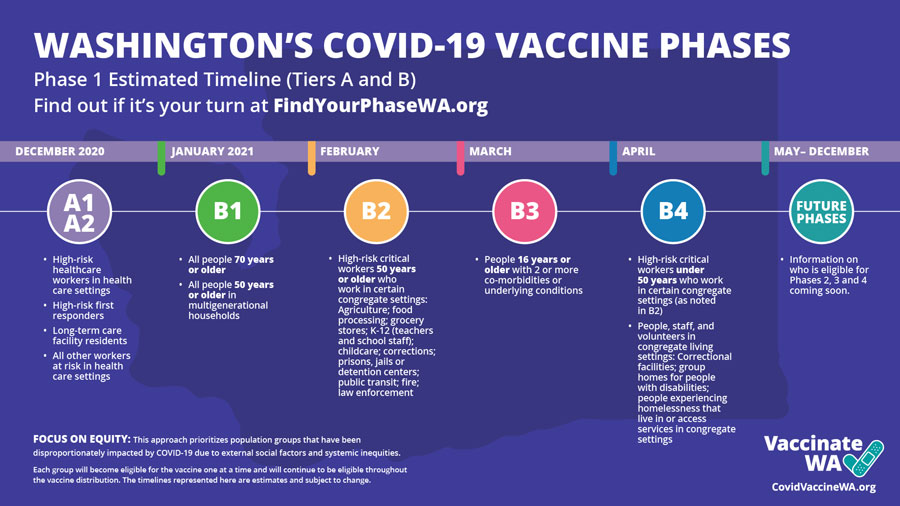With the emergency approval and distribution of COVID-19 vaccines underway, AWC thought it would be helpful to round up some of the pertinent information regarding vaccines in the workplace for our city employers. Here are some of the items that you need
to know.
Washington’s vaccination schedule
On January 6, the Department of Health issued new guidance on the next phase
(1B) of COVID-19 vaccine prioritization plan through April of this year. The current phases in effect are for A1, A2, and B1 groups. This means that the following people are now eligible to get vaccines:
- A1
- High risk healthcare workers in healthcare settings
- High risk first responders
- Long-term care facilities residents
- A2
- All other workers in healthcare settings
- B1
- All people 70 years or older
- All people 50 years or older in multigenerational households.

Washington’s expected vaccine prioritization schedule. Via Washington Dept. of Health.
More information on vaccine distribution planning can be found here. Providers wishing to distribute COVID-19 vaccines must enroll in a federal vaccine
distribution program, coordinated through the state immunization program. Vaccination is paid for by the federal government and is free out-of-pocket to patients wishing to get vaccinated.
If you are wondering when you will eligible to receive a COVID-19 vaccine, the Department of Health is developing a new online tool to inform Washington residents when they are eligible for the vaccine: Phase Finder. Phase Finder is begin
tested now and is expected to launch to the general public on January 18.
EEOC issues guidance on workplace vaccines
Most employers have implemented workplace policies that require employees to stay home from work if they are ill. Fewer employers have implemented workplace programs that mandate employee vaccinations against certain diseases. Employers will need to consider
federal and state laws on workplace discrimination and workplace safety. While a mandatory vaccination program may pass legal hurdles, there are many other areas of consideration, including administering exemptions, access to the vaccine, communicating
policies to employees, obtaining evidence of a vaccination, and the list goes on.
Ultimately, employers should work with their human resources department and legal counsel if investigating a mandatory employee vaccination policy.
On December 16, The U.S. Equal Employment Opportunity Commission (EEOC) issued guidance on COVID-19 vaccines. Under the guidance, vaccinations themselves are not considered a “medical examination” for purposes of the Americans with Disabilities
Act (ADA), but vaccine screening questions are likely subject to ADA standards for disability related inquiries.
Generally, employer mandated vaccinations are allowed if the employer conducts an individualized four-part legal test under the ADA to determine if the vaccine is necessary to prevent a “direct threat” to the workplace, subject to reasonable
accommodations. Employers requiring proof of COVID-19 vaccination is not a disability-related inquiry under the ADA; however, the employer should advise the employee to not provide any personal medical information as part of their proof.
The guidance states that employers are required to find reasonable accommodations for employees that refuse vaccines because of a sincerely held religious belief, practice, or observance unless the objection would be an “undue hardship” on
the employer under the Civil Rights Act. In such a case, the employee can be excluded (though not necessarily terminated) from the workplace.
More detailed information on the EEOC guidance can be found here.